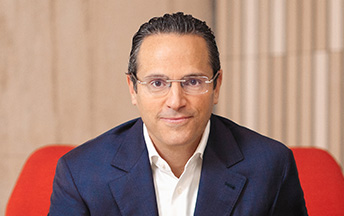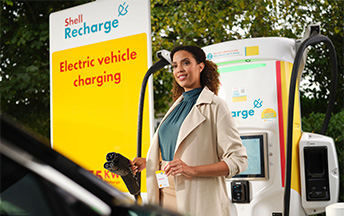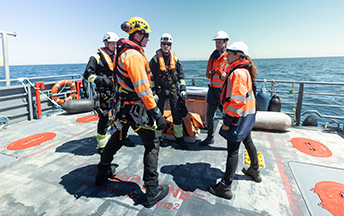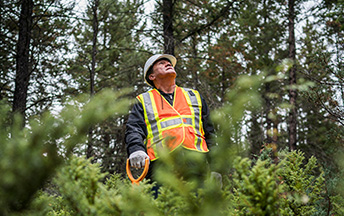Diversity, equity and inclusion
Powering progress
We are focusing on removing barriers and creating equality of opportunity in four strategic priority areas: gender; race and ethnicity; lesbian, gay, bisexual and transgender (LGBT+); and disability inclusion and enABLEment, as set out in our Powering Lives commitments to diversity and inclusion.
- Shell is working towards achieving 35% representation of women in our senior leadership positions by 2025 and 40% by 2030.
- We aim to increase racial and ethnic representation across our workforce so that we better reflect the communities in which we work and live.
- At Shell, we seek to provide a safe, caring and inclusive environment for LGBT+ and PWD (people with disabilities) staff so that they can be themselves and reach their full potential.
- By 2030, we will make our global network of service stations more inclusive and accessible to customers with physical disabilities.
Employee engagement and dialogue
We want to make Shell an attractive employer. We seek to do so by offering career progression tools, such as individual development plans; flexible working options; global minimum maternity leave of 16 weeks and, from January 2023, at least 8 weeks paid parental leave for non-birthing parents; initiatives and programmes to help create a supportive working environment for employee well-being; and engagement with employees through multiple forums and channels.
The Shell People Survey is one of the key tools we use to measure employee engagement, motivation, affiliation and commitment to Shell. In 2022, the survey attained its highest ever response rate of 87% (up 3.4 percentage points from 2021). The average employee engagement score rose three points to 78 out of 100. Shell employees have access to senior leaders, local employee forums and employee resource groups. The Shell Global Helpline is available for employees to raise concerns or dilemmas, anonymously if they wish.
Read more about employee engagement in our 2022 Annual Report.
Diversity, equity and inclusion
Our ambition is to become one of the world’s most diverse and inclusive organisations, a place where everyone – including employees, customers, partners and suppliers – feels valued, respected and has a strong sense of belonging. This ambition underpins our strategy and makes us a stronger organisation.
We are focusing on removing barriers and creating equality of opportunity in four strategic priority areas:
Gender
At the end of 2022, 55% of our Board of Directors and 22% of our Executive Committee were women.
We are working towards achieving 35% women in our senior leadership positions by 2025 and at least 40% by 2030. At the end of 2022, 30.4% of senior leadership were women, up from 29.5% in 2021.
In 2022, 40% of experienced hires were women compared with 44% in 2021. Our graduate hires have consistently been 48% or 49% women since 2019, against our 50% ambition. In 2022, 49% of our graduate hires were women, compared with 55% in 2021.
Our overall representation of women in Shell was 33% at the end of 2022.
Race and ethnicity
We aim to increase racial and ethnic representation across our workforce so that we better reflect, and support equity in, the communities where we work. We are focusing on the Netherlands, the UK and the USA, as these are the Shell hubs where we see the most significant opportunities for representation and inclusion of minority employees (see shell.com/dei for details).
At the end of 2022, Shell had one director from a minority ethnic group on its Board of Directors. At the time of publication of this report, Shell plc’s Board has three members from a minority ethnic background, which exceeds the UK’s Parker Review recommendation of at least one. In addition, one of our Executive Committee members identifies as being from a minority ethnic group.
LGBT+
We are working to advance lesbian, gay, bisexual and transgender plus (LGBT+) inclusion within Shell and the communities where we work. We promote equal opportunity and create an environment where people feel included, regardless of sexual orientation.
We benchmark our initiatives externally. In 2022, we were recognised as well advanced in LGBT+ workplace inclusion in the Workplace Pride Global 2022 Benchmark. We also received a 100% score from the Human Rights Campaign Corporate Equality 2022 Index and have been awarded top score every year since 2016.
Disability inclusion and enABLEment
We aim to create an inclusive, psychologically safe and accessible environment where people with disabilities can excel. We provide support and make adjustments for people with disabilities during the recruitment process and throughout their careers with Shell. This includes equal access to valuable educational resources, training programmes and emphasis on personal and professional development.
Our Global enABLEment Coalition, made up of leaders from our Employee Resource Groups, helps to shape and drive the enABLEment strategy across Shell. We now have 15 enABLE employee resource groups around the world. Our workplace accessibility service covers 81 locations worldwide to ensure that all employees have access to reasonable workplace adjustments so that they can work effectively.
We are also providing a better experience for our customers with physical disabilities through an app, delivered by fuelService, that allows any customer with a disability to alert stations in advance and request assistance. As of December 2022, Shell offered the service at almost 7,800 stations in 10 countries.
Read more about diversity, equity and inclusion in our Annual Report and at www.shell.com/DEI.
Our people in 2022
-
93,000
employees at December 31, 2022
-
>70
countries and territories in which we operate
-
55%
women on the Board of Directors
-
22%
women on the Executive Committee
-
30%
women in senior leadership positions
-
33%
women employees
-
266,000
formal training days for employees, joint venture partners and contractors
-
10,076
experienced people joined Shell (40% women, 60% men)
-
332
graduate hires joined Shell (49% women, 51% men)










